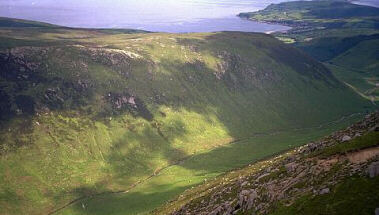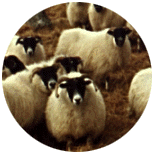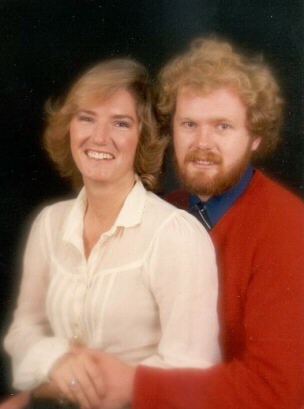
I then lived in Northern England; and Peter, my friend, came down from his home in Scotland to pick me up and take me back to meet his parents and three older brothers for the first time.
The two-hundred mile drive through the verdant pastures of Northern England and on up through the weathered moorlands and dense forests of Scotland, was only a taste of what was to come later. I was looking forward to meeting Peter's parents who owned a sheep farm in Milngavie, (mill-guy) just seven miles to the north of Glasgow. They named their 2,000 acre farm "High Craigton" which was a small ‘bed and breakfast' business as well as a sheep farm. The windswept rolling fields on their farm overlooked the well-known Loch Lomond.

As we neared Peter's farm, the roads became so narrow that we occasionally had to pull over in order to let the oncoming traffic pass by us. At last, in the early evening, just before the sun set, we turned into the driveway of "High Craigton".
The 200-yr-old, white, farm house was perched on the hill. It had freshly-painted whitewashed-walls, a black slate roof and small mullioned windows brightened with deep sills that held flower-filled window boxes. The farm house was framed in a sea of green fields that sprawled clear to the horizon.
The hillsides were alive with the cries of new lambs; some celebrating life frolicking in the short grass while others were bleating and nuzzled against their mothers with determination to quench their thirst. In the driveway, a Border Collie, pausing from his labors of rounding-up sheep, barked at our arrival. A trail of smoke spiraling out of the chimney completed this story-book picture.
Upon being introduced to Mr. and Mrs. Fisken, I was immediately put at ease when they asked me to use their first names, Mary and Peter. Mary gave me a warm motherly hug; she asked us how our drive up had been and if we were hungry. We chatted briefly and then Mary told Peter Jr. to show me to the guest bedroom while she put the kettle on and made us a little snack.
The farm was as cozy on the inside as it appeared from
outside.
My bedroom had all the charms of a country farmhouse.
The floor had a two-foot-wide, polished-wood border surrounding a thick,
pale-peach carpet. The bed sat high, looking so inviting, with its
homemade white crocheted bed spread. I sat on the soft bed while
gazing at my surroundings. A tiled fireplace on one wall had a large
brass, fan-shaped stand hiding its unlit hearth. The ample sized
window, tastefully framed with cotton lace curtains, looked down
on the courtyard, where I noticed Mr. Fisken, sucking on his pipe, as he
sauntered toward his barn; his faithful Border Collie close to his
heals. The bedroom walls were covered with a rich, cream-colored
wallpaper decorated with oak-framed pictures of farms and various country
scenes. One main feature in the bedroom was an antique, maple-wood,
kidney-shaped dressing table. It was topped with a beveled mirror
just catching the sun's last rays. Upon the dressing table
sat a Wedgewood- patterned, china water-pitcher and matching bowl that
was placed on a handmade lace doily. To the side of that was a vase
filled with lively white and yellow daisies.
I was just about to flop back on the feather bed when I heard Peter shouting from the bottom of the stairs "Tea's up." Slightly hesitant to leave this dreamy bedroom, I stood up and headed toward the aroma of fresh baked bread. Peter stood waiting at the bottom of the stairs. He knew I was still a little nervous. Without saying a word, he took my hand as we both walked childishly grinning toward the delicious smell coming from the kitchen.
From the hallway we could see Mary pulling hot fresh-baked scones out of this enormous gleaming Aga-Cooker. An Aga cooker burns wood to centrally-heat a home and function as a stove and oven. They are about twice the size of an average American stove, made of cast-iron making them very heavy.
Mary was talking to Adam, her second son, while he was washing his hands at the sink in front of the window. The darkness outside was causing the black window to reflect Adam's bearded face. As we walked through the door way Mr. Fisken said, " Oh! There ye are. Come on in lassie and sit yoursell doon".
Color rose to my face as I was invited to sit at a large table, surrounded by ten chairs, placed in the center of a spacious kitchen. On top of the white table cloth sat six fine-china tea cups, an embroidered tea-cozy covered what I was sure would be a matching tea pot, along with a decorative bowl heaped with whipped cream and a pot filled with homemade strawberry jam. In the center of the table was a two-tiered china tray overflowing with assorted sandwiches; salmon, cucumber with cream-cheese, and roast beef, all cut into ‘delicate' triangular shapes with the crust cut off. The table setting seemed almost out of place in front of the four-masculine men.
Mary placed the hot scones on the table. As she sat down, Jim, her eldest son, walked in with a newspaper rolled up under his arm and pulled a chair out next to his father. While glancing at the four men flanking Mary, I wondered if she sometimes craved female companionship.
During the following hour, the family talked about the jobs that needed to be done before the Laird came to inspect their property. They had already whitewashed the house, but the out buildings still remained to be done. Mary wanted a new carpet put down in her kitchen that had the ‘lived-in' feeling of a family-room. The plumbing needed fixing in the downstairs shower. Fencing along the main road needed some repair, and the garden surrounding the small cottage down the road, that Adam lived in, needed "a-right-good-going-over."
Mr. Fisken seemed flustered with the whole business. He had a lot on his plate. Their busiest season coming up, training a new dog, all those sheep to sheer, dip and take to the market. As he reached for one of the ‘delicate' sandwiches he looked at Mary, "why ever ya cut these up like this woman, is beyon me, anyone'd think the queen was comin" he said, with a trace of a smile and an exaggerated wink sent in my direction.
The clock ticked around to 10:00pm. Adam looked tired as he pushed his chair back from the table and said that he wanted an early night. Mr. Fisken said "I'm not surprised, after all that whiskey last night" Mr. Fisken told him to be damn sure that he didn't forget to set his alarm ‘this time', and he made it plain that he was getting fed up of having to walk down to the cottage at 5am and pound on his window. They talked briefly about taking the new dog out, in the morning, for some more training. Mr. Fisken seemed disappointed with the progress and wondered if the dog would ever make the grade. Young Pete glanced at me, rolled his eyes and asked if I fancied watching the television. As we walked into the front room, Pete said "now you know why I went into the Merchant Navy".
That night, I headed for my bedroom anxiously waiting for the sunrise. I hadn't seen sheep being sheared before and hoped that I'd be able to get involved. Before getting into the bed, I opened the window. The brisk damp air rushed in. A full moon was shining on the trough that would be used to dip the sheep. In the shadows, I could see the U-shaped hook that would force their heads under the liquid. In the distance the lambs were bleating, and the Border Collies were pacing up-and-down inside the shed.
After breakfast, Peter and I planned to walk over the fields surrounding the house. We were looking for what he called ‘cowpeas'. As we walked along, Peter explained to me that the name ‘cowpea' was given to a sheep that had fallen down and couldn't get back up because their fleece was so heavy just prior to shearing. If we don't find the fallen sheep in time, its stomach would fill with gas, and might cause the sheep's stomach to explode. The timing of shearing is critical, too soon and the fleece won't hold together while they are being rolled up into a tight bundle.
We finished our breakfast, got changed ,and set off. We walked for miles; the sun, shining brilliantly through the thick cloud-breaks, dappled the fields.

"Here" shouted Adam "have a go at rolling this one up" as he threw the fleece toward me. I watched the other people rolling up the fleece and tying up the bundle with the thin woolen strips that used to cover the legs of the sheep.
Two distinct piles were forming. One pile from the Blackfaces that was a course wool used for rugs, and the other from the Cheviots, a softer wool used for sweaters. Both are hill sheep that are small and have good, long fleeces.

It was all over . . . they were set free and seemed unsure what to do with their light bodies. They leaped about ran in semicircles, darted here and there braying and disoriented.
The day was nearly over, we were all exhausted. My hands and arms were full of thick, greasy lanolin that came from rolling up the fleece. My hair was covered with bits of wool and looked almost white. A good soak in a tub was high on my list of priorities, that and a glass of wine in front of a roaring fire while waiting for that home cooked meal Mary had been preparing most of the afternoon.
I went to bed tired that night but with a warm inner glow, thinking that life on a sheep farm seemed idyllic, and I wondered if the Fisken family felt the same way. I knew that they would not exchange their sometimes phsyically hard way of life for all the temptations of an exciting, city life; and as I buried my head into the warm pillow that night, I knew why.
Wendy (Rushton, aka: Howarth) ![]() Back TO Main Page
Back TO Main Page
